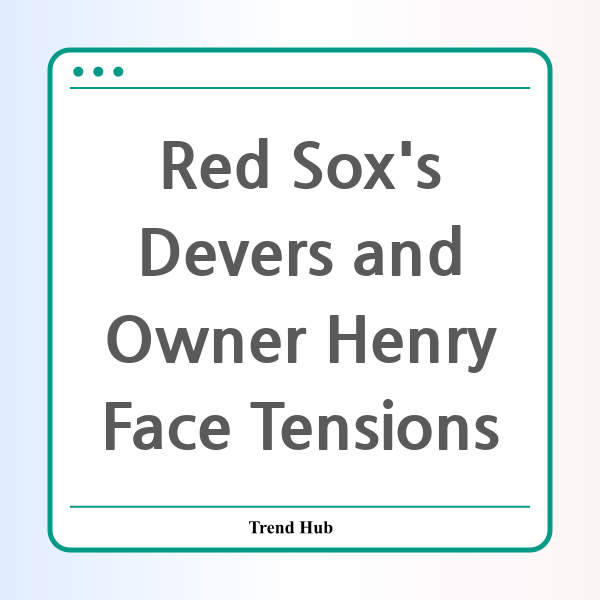* This website participates in the Amazon Affiliate Program and earns from qualifying purchases.

Is Rafael Devers the future of the Red Sox, or is his relationship with the team unraveling? The recent sit-down between Devers and owner John Henry highlights the brewing tensions within the Boston Red Sox organization. With a hefty 10-year contract worth $313.5 million and a significant decision looming regarding his position, all eyes are on Devers to see how he navigates this rocky terrain.
During the past week, tensions between the three-time All-Star and the Red Sox front office reached a boiling point. The catalyst for the unrest was the front office's suggestion that Devers, who initially served as the designated hitter, might need to transition to first base. This suggestion was met with fierce opposition from Devers, who had previously expressed dissatisfaction with the move and felt blindsided by the lack of communication and clarity from the management.
Owner John Henry's decision to meet directly with Devers in Kansas City was a rare move intended to quell the unrest. Joined by Chief Baseball Officer Craig Breslow and President Sam Kennedy, Henry aimed to foster dialogue and address the internal conflicts following Devers' outspoken remarks about the organization’s changes. "I don't understand some of the decisions that the GM makes," Devers voiced during a press conference, emphasizing the disconnect he felt with the management.
Since signing Alex Bregman—a player acknowledged for his superior defensive skills at third base—to a lucrative contract, concerns about Devers' long-term position have escalated. Although Bregman’s short-term deal could lead to an opt-out after this season, the Red Sox seem to be positioning themselves for optimal performance, which has shifted Devers further from third base, where he has played for most of his career.
In the midst of this chaos, Devers has been performing at a respectable level, with a batting average of .255, six home runs, and 25 RBIs as of the meeting. Despite feeling underappreciated, he has continued to contribute as the designated hitter while utility players step in to fill the gap at first base. The ambiguity surrounding his future has led to questions about his emotional investment in the team and how it affects player morale.
Henry and the Red Sox’s management are tasked with more than just stabilizing player positions; they need to maintain a cohesive team dynamic that is crucial for competition. Breslow articulated the importance of continued communication with players, stressing that while organizational priorities must be upheld, players’ sentiments must also be respected. "It’s my job to always put the priorities of the organization first," Breslow stated. He acknowledged the need for better dialogue, hinting that the ongoing conversations about Devers’ position are necessary for the team’s success.
The question remains: will Rafael Devers find common ground with the Red Sox management, or will the discord lead to a fracture that could impact both his performance and the team’s success? The outcome of this situation might well determine how the Red Sox navigate the remainder of the season and beyond.
Regardless of the outcome, the Red Sox are in a crucial phase of their season, and the players must be aligned if they are to compete at the highest level. With essential games ahead, both Devers and the team's leadership must prioritize their relationship to ensure that the focus remains on winning and sustaining the franchise's historic legacy.
* This website participates in the Amazon Affiliate Program and earns from qualifying purchases.